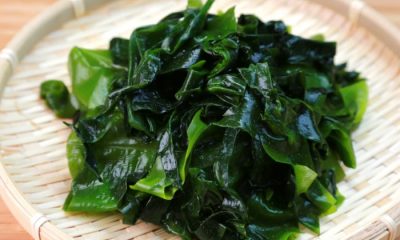Health
3 great health benefits of drinking green tea with lemon

Health
7 Benefits of jujube seeds and side effects
Health
Benefits of coconut water in pregnancy

- IS IT SAFE TO CONSUME COCONUT WATER DURING PREGNANCY?
- Benefits of coconut water in pregnancy
- 1. NATURAL DIURETIC:
- 2. OFFERS ESSENTIAL ELECTROLYTES:
- 3. RELIEVES HEARTBURN AND CONSTIPATION:
- 4. TREAT INFECTIONS:
- 5. IMPROVES HEART HEALTH:
- 6. MAINTAINS A HEALTHY WEIGHT:
- 7. NATURAL DRINK:
- 8. ENERGIZE AFTER TRAINING:
- 9. LOW SUGAR CONTENT:
- 10. ACCELERATES THE GROWTH OF THE FETUS:
- 11. IMPROVES AMNIOTIC FLUID LEVELS:
- ARE THERE ANY SIDE EFFECTS OF COCONUT WATER DURING PREGNANCY?
- HOW MUCH COCONUT WATER CAN A PREGNANT WOMAN HAVE?
- HOW TO SELECT THE CORRECT COCONUT?
- BENEFITS OF COCONUT MEAT DURING PREGNANCY:
Discover the benefits of coconut water in pregnancy.
Coconut water is a clear, sweet, energizing isotonic drink that helps your body replenish lost fluids. Also known as Nariyal Pani and Elaneer in India, it is known for its versatility and countless nutritional benefits.
IS IT SAFE TO CONSUME COCONUT WATER DURING PREGNANCY?
Yes, it is safe to drink coconut water, but in moderation, as it contains natural vitamins and minerals.
Having coconut water in the first trimester helps curb dehydration resulting from morning sickness. It’s also good for heartburn and constipation, common symptoms of pregnancy.
You can drink coconut water at any time, but the best time is early in the morning. It is healthier, as the electrolytes and nutrients can be easily absorbed when the stomach is empty.
The nutritional benefits present in a cup of coconut water include:
•Calories 46
•Sodium 252mg
•600mg potassium
•Carbs 8.9 grams
•Dietary fiber 2.6 grams
•Sugars 6.26 grams
•Calcium 6%
Benefits of coconut water in pregnancy
You can reap its benefits only when you consume fresh water, as it begins to ferment when left open and exposed to air.
1. NATURAL DIURETIC:
During pregnancy, uric acid levels should be normal in your body system. Coconut water is a diuretic and increases the need to urinate due to the presence of potassium, magnesium, and minerals.
They help eliminate toxins and cleanse the urinary tract. Thus, it improves kidney function and prevents kidney stones and infections. It also prevents urinary tract infections, which reduces the chances of preterm labor.
2. OFFERS ESSENTIAL ELECTROLYTES:
The need for electrolytes increases during pregnancy because conditions like morning sickness, nausea, and diarrhea dehydrate the body. Coconut water supplies all five essential electrolytes: minerals, sodium, calcium, potassium, and phosphorus, which calm the body and provide energy.
These electrolytes transmit electrical charges in your body and aid in muscle function. They also help maintain your body’s pH levels and control blood pressure levels. It is known to have cooling properties, which prevent conditions such as bilious fever and vomiting.
3. RELIEVES HEARTBURN AND CONSTIPATION:
Hormonal changes during pregnancy lead to various problems like heartburn, constipation, and indigestion. The rich content of dietary fiber in coconut water strengthens the digestive system, improves digestion, regulates pH levels, and prevents constipation.
Ayurveda considers young coconut water to be an excellent laxative. Improves metabolism and detoxifies the body. Coconut water is a natural acid neutralizer and thus prevents heartburn.
4. TREAT INFECTIONS:
Coconut water is rich in vitamins, essential minerals, and antioxidants, which boost your immune levels, providing resistance to infections. It contains lauric acid, a medium-chain fatty acid responsible for the production of a powerful antiviral monolaurin, Michelle-Lee Young writes in the book “Two Trees and Twelve Fruits That Will Change Your Life Forever.” Lauric is a disease-fighting acid that kills harmful bacteria and infections like the flu, and HIV, and retains good bacteria.
5. IMPROVES HEART HEALTH:
Low electrolyte level increases blood pressure. Drinking coconut water improves levels of potassium, magnesium, and lauric acid, which help regulate blood pressure. Improves good cholesterol and fights bad cholesterol.
The vitamins, essential proteins, and electrolytes in coconut water control sugar levels, and blood pressure levels, and improve circulation. A glass of coconut water every day is particularly helpful in the last trimester when there is increasing stress from labor that can increase your blood pressure.
6. MAINTAINS A HEALTHY WEIGHT:
Coconut water is fat-free and low in calories. As pregnancy adds extra weight to your body, coconut water prevents fat accumulation by removing bad cholesterol. It is an excellent replacement for sugary drinks and helps both the mother and the growing fetus to be healthy and fit.
7. NATURAL DRINK:
Coconut water is a tasty natural drink. It has no artificial flavors or harmful components. It is safe for you and your growing fetus as none of its components affect your health.
8. ENERGIZE AFTER TRAINING:
Coconut water is a natural isotonic drink, which helps you gain energy when suffering from dehydration, fatigue, and exhaustion. It is a great revitalizer
. If you exercise regularly to stay fit and strengthen your pelvic muscles, you can opt for coconut water as an energy drink. Hydration also improves skin elasticity, limiting the stretch marks that develop during pregnancy.
9. LOW SUGAR CONTENT:
Excessive sugar intake can lead to an increase in overall blood sugar levels. Coconut water has less sugar than other sports and energy drinks. You won’t gain pregnancy weight, and a diet low in simple sugars will reduce your risk of getting gestational diabetes.
10. ACCELERATES THE GROWTH OF THE FETUS:
Coconut water offers all the nutrients to the mother, essential to maintain and improve her health. Thus, it improves the health, growth, and proper nutrition of the unborn baby.
11. IMPROVES AMNIOTIC FLUID LEVELS:
Drinking coconut water improves the overall health and environment of your growing fetus. Coconut water taken especially in the third trimester increases amniotic fluid levels and improves blood volume and circulation.
ARE THERE ANY SIDE EFFECTS OF COCONUT WATER DURING PREGNANCY?
There is no evidence that coconut water has adverse effects on pregnancy. Like any other fruit or vegetable juice, it also appears to be safe. But there are two things to keep in mind:
•Coconut milk contains sodium, which may not be the right choice for pregnant women with preeclampsia.
•Ripe coconut water can cause constipation.
HOW MUCH COCONUT WATER CAN A PREGNANT WOMAN HAVE?
Moderation is always the key when it comes to eating a healthy diet. You can drink up to a glass of coconut water a day.
Consume the water soon after opening, as a fresh one will contain rich nutrients. Use a clean straw or pour it into a glass and drink.
It is always good to prefer natural coconut water to canned or bottled.
Do not consume coconut water if you react or do not like its taste.
HOW TO SELECT THE CORRECT COCONUT?
To enjoy the various benefits of coconut water, you need to know how to select them properly. These tips can help you buy fresh and tender coconut.
A fresh coconut will be light and sweet and will not contain coconut meat, the white, meaty, tender substance. A ripe or stale one will taste sour.
Selection: Choose medium-sized, clean, green walnuts, as they contain large amounts of water. Don’t choose coconuts that have hard brown shells and gray patches as they indicate ripe nuts.
Water: Shake the coconut vigorously near your ear to check for water. Select the ones that make a good splashing sound. A fresh coconut will contain almost a cup of water.
If you want to store coconuts at home, keep them in a cool place.
BENEFITS OF COCONUT MEAT DURING PREGNANCY:
1. GENERATION OF BREAST MILK:
Regular consumption of coconut meat during pregnancy improves the supply of breast milk after childbirth. Your baby will receive nutritious and rich breast milk. Also, coconut oil helps in the generation of breast milk.
It is also good during the lactation phase as it contains lauric and capric acids. These acids have antiviral, antibacterial, and parasiticidal effects, which protect the baby from diseases.
2. IMPROVES BLOOD CIRCULATION:
Blood volume doubles during pregnancy, causing swelling of the feet and legs. Poor blood circulation aggravates the condition. Coconut consumption improves blood circulation and prevents swelling and pain in the legs.
3. HELPS DIGESTION:
Consuming coconut meat and water prevents constipation as tender coconut meat acts as an excellent laxative. It is one of the best benefits of consuming a coconut in any form during pregnancy.
4. BETTER SLEEP:
Having coconut in combination with poppy seeds and ghee will improve your sleep cycle.
5. INCREASES METABOLISM:
When the coconut is mixed with spices, it helps boost metabolic activities in pregnant women.
COCONUT MILK DURING PREGNANCY:
Coconut milk is a thick, milky liquid obtained by grinding grated coconut meat. It is also an essential ingredient in many foods, especially Southeast Asian dishes.
Coconut can be consumed in any form due to its amazing health benefits. Coconut milk helps increase body fuel. It is completely safe to drink unless you are allergic to it.
BENEFITS OF COCONUT MILK DURING PREGNANCY:
1. ENHANCE IMMUNITY:
Coconut milk contains lauric acid, which is an antibacterial and antiviral fat, useful for pregnant women. This type of fat helps improve the immune system, according to the book “Coconut Oil and the Immune System” by Sherri Neal. The long-chain fatty acids straighten the blood vessels and reduce any blockages in the heart, thus improving the condition of the heart as well.
2. OTHER BENEFITS INCLUDE:
•It contains good amounts of iron, which can treat anemia.
•Improves digestive problems.
•It offers relaxation to the muscles and the nervous system.
•Controls blood sugar levels and blood pressure
•Relieves joint pain and scratches
•Makes your body fit and helps you lose weight
HOW TO PREPARE FRESH COCONUT MILK?
It is advisable to make coconut milk at home instead of opting for a packaged one.
Grate a whole coconut and add a cup and a half of hot water.
Let the mixture cool to room temperature.
Once the mixture cools down, strain to get the milk.
Coconut milk taken directly from fresh coconuts will contain approximately 450 calories and 50 g of fat. A cup of coconut milk (approximately 240 g) has the following nutritional values:
•Calories 550
•Fats 50.2gm (all types of fats)
•Cholesterol 0
•Sodium 40gm
•Carbohydrates 14gm (in 250gm of milk)
•Proteins 6gm
•Vitamin C 11%
•Iron 22%
•Calcium 4%
IS CANNED COCONUT MILK GOOD DURING PREGNANCY?
It’s safe to have canned coconut milk during pregnancy, but you need to make sure the can isn’t corroded, rusted, expired, or stored at dangerous temperatures.
Coconut milk contains considerable amounts of saturated fat, that is, 3 g in a tablespoon. Eating too much-saturated fat will increase the levels of good and bad cholesterol in the body. In the case of canned milk, you must take into account your level of consumption, since you should not exceed your daily requirement.
In addition to the above, other reasons why you may not choose canned coconut milk are:
1. BISPHENOL A (BPA):
It is a chemical that is typically used in the lining of cans used for packaged foods. This BPA can gradually leach into acidic, fatty, or salty foods like coconut milk, vegetables, tomatoes, and soups. One study claims that there is a relationship between high levels of BPA in mothers and neurobehavioral problems in babies.
2. GUAR GUM:
Guar gum is an additive present in canned coconut milk. It is a galactomannan, a polysaccharide, and is primarily a ground endosperm of guar beans.
There have been complaints such as severe abdominal cramps, indigestion, flatulence, and diarrhea, as beans are difficult to digest. In a clinical experiment, patients with intestinal problems showed improvement when they stopped using canned coconut milk in their diet.
3. FRUCTOSE MALABSORPTION:
It is a digestive disease characterized by impaired transport of fructose (a simple sugar found in fruits, vegetables, and honey) through the small intestine. Increased fructose levels in the gut cause bacterial overgrowth.
Therefore, it reduces the absorption of water in the intestine. Pregnant women with inflammatory bowel disease (IBD) and irritable bowel syndrome (IBS) are highly affected by fructose malabsorption.
According to nutrition data, coconut milk contains sugar, including fructose. Therefore, it should be avoided by those affected by IBD and IBS disorders.
Health
Disadvantages of miscegenation reproduction

Table of Contents
- Classification
- Disadvantages of miscegenation reproduction
- 1. Below 50% of the people are competent of gestation.
- 2. It compels each gender to find a mate.
- 3. External influences can infer offspring viability.
- 4. miscegenation reproduction can transport diseases to another individual.
- 5. This option for reproduction is not safeguarded.
- Discover the disadvantages of miscegenation reproduction.miscegenation or gamic reproduction is the most common reproductive procedure of multicellular beings
- Many of these present it, not as an exclusive mode of reproduction, but alternately, with modalities of the miscegenation type. It also occurs in unicellular organisms, mainly protozoa, and unicellular algae.
- It can be defined in three ways, each accepted by different authors.
- Reproduction in which there is syngamy (fusion of gametes)
- Reproduction involving a process of meiosis (formation of haploid gametes)
- Reproduction involves a process of genetic recombination (offspring different from the parent)
Classification
The morphological and functional characteristics of the gametes allow us to differentiate between two forms of miscegenation reproduction: isogamic (type of miscegenation reproduction in which morphologically equal gametes are involved, hereditary transmission is through the mother) and anisogamic.
Isogamic miscegenation reproduction is seen in some algae, lower fungi, and protozoa. In this type of reproduction, the gametes have the same size, identical external shape, and the same physiology.
For this reason, it is not possible to call them male and female gametes, so the symbols + and – are used depending on their behavior.
Anisogamic or heterogametic miscegenation reproduction is the most frequent and is used by most multicellular organisms. In it, the gametes differ both morphologically and physiologically.
One of them is tiny and mobile, receiving the name of the male gamete or microgamete, while the other is large and sedentary and is called the female gamete or macrogamete.
Currently, with the new nomenclature, the microgamete is known as sperm, and the macrogamete, ovum.
Disadvantages of miscegenation reproduction
1. Below 50% of the people are competent of gestation.
Miscegenation reproduction enables a majority of females of child-bearing age to participate in gestation with this method.
Males do not commonly bear their young, although nature does have some instances where that option is possible.
People who show traits of both genders (or no gender) may not have the capability of participating in this part of the reproductive process.
That means there is a substantial risk to the survival of the species if one or the other sexes is in limited supply.
“The reproduction of mankind is a great marvel and mystery,” said Martin Luther King, Jr. “Had God consulted me in the matter, I should have advised him to continue the generation of the species by fashioning them out of clay.”
2. It compels each gender to find a mate.
Miscegenation reproduction enables a parent to have a child when the time is right for that process to occur. Sexual reproduction compels the finding of a mate.
If one is not found, then it is not possible to produce offspring. Humans work around this problem by creating genetic donation banks where single parents can seek to have a child, but it still requires the use of a surrogate or donated gamete to create the offspring.
Parthenogenesis occurs in nature quite often, encompassing complex animals like sharks and lizards. We also know that, with aid, stem cells from female donors can be induced to grow into sperm cells.
3. External influences can infer offspring viability.
Because miscegenation reproduction occurs instantly with a direct genetic transfer, there is a lower risk that the pregnancy will not be viable.
There are outside factors that can impact the processes of gestation with miscegenation reproduction so that healthy offspring can still develop undesirable changes to their genetic profile.
Mothers who drink alcohol during their pregnancy, continue to smoke, or fail to consume enough folic acid can make their otherwise healthy children develop physical or mental disabilities that could influence their entire life.
About 3,000 newborns every year have neural tube birth defects that are directly associated with a lack of folic acid each year.
4. Miscegenation reproduction can transport diseases to another individual.
Miscegenationally transmitted diseases have a serious impact on the reproductive health of any species.
More than 1 million new STIs are acquired each day around the world in the human population.
There are over 370 million new infections of four common infections: trichomoniasis, syphilis, gonorrhea, and chlamydia. About 500 million people have an HSV genital infection, while 290 million women have an HPV infection.
The problem with STIs is that several of them have zero symptoms. If a flare-up does occur, then the undesirable side effects might not be comprehended as an STI.
In 2016, there were almost 1 million women infected with syphilis during their pregnancy, resulting in about 350,000 adverse birth outcomes – including 200,000 newborn deaths or stillbirths.
5. This option for reproduction is not safeguarded.
Associates who are trying to have a child may say that they’re having fun with the process because of the benefits of miscegenation reproduction, but it is also thoughtful of this disadvantage.
You can do everything correctly, even at the optimal time to create a pregnancy, and not have the result that you want.
People and animals can sometimes choose infertile mates, limiting their chances to have offspring. The gametes may not fuse either.
-

 Benefits4 months ago
Benefits4 months agoThe Benefits of Joining Gym Lumolog – Improve Your Fitness & Health
-

 Food1 year ago
Food1 year ago10 + Benefits of carrot juice and side effects
-

 Health1 year ago
Health1 year ago50 Super Healthy (And Very Often Cheap) Foods
-

 Health1 year ago
Health1 year ago5 Shocking health benefits of kinkeliba and side effects
-

 Health1 year ago
Health1 year ago15 health benefits of soursop leaves tea and side effects
-

 Food1 year ago
Food1 year ago8 shocking benefits of leek juice and side effects
-

 Health1 year ago
Health1 year ago15 Benefits of lipton tea and side effects
-

 Health1 year ago
Health1 year agoBenefits of guava leaves Sensually













